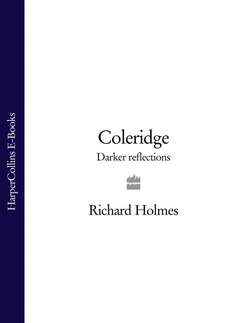Читать книгу Coleridge: Darker Reflections - Richard Holmes - Страница 30
8
ОглавлениеIt is very difficult to reconstruct what followed. Two days after Christmas, early in the morning, there was some sort of confrontation between him and Asra and Wordsworth. (Possibly Coleridge had been up all night, and gone into her room, but this is speculation.) Coleridge seems to have run out across the fields to the local inn, the Queen’s Head, in a mood of despair and started drinking the “strong ale” that Dorothy had feared. He stayed alone at the inn most of the morning, drinking and writing in his Notebook. At the inn, Coleridge emblazoned into his Notebook, in huge, drunken capital letters, two portentous words, “THE EPOCH”, followed by three pages of frantic scrawl. Later he tore out all these pages, leaving only the Delphic explanation: “Saturday, 27th December, 1806 – Queen’s Head, Stringston, 1/2 a mile from Coleorton Church, 50 minutes after 10.”45*
Though he destroyed his original Notebook entry, Coleridge reverted quite explicitly to this moment of confrontation in a series of painful subsequent notes. In September 1807 he wrote: “O agony! O the vision of that Saturday morning – of the Bed – O cruel! is he not beloved, adored by two – & two such Beings. – And must I not be beloved near him except as a Satellite? – But O mercy, mercy! is he not better, greater, more manly, & altogether more attractive to any but the purest Woman? And yet…he does not pretend, he does not wish, to love you as I love you, Sara!”46
Again, in May 1808, he broke out: “O that miserable Saturday morning! The thunder-cloud had long been gathering, and I had now been gazing, and now averting my eyes, from it, with anxious fears, of which I scarcely dared be conscious…But a minute and a half with ME and all the time evidently restless & going – An hour and more with Wordsworth – [in Greek code] in bed – O agony!’47 Several of the poems he wrote at Coleorton over the next three months all touch, more or less obliquely, on this sense of Wordsworth’s and Asra’s devastating betrayal.
Was this “vision” of Wordsworth and Asra in bed together real then? Or was it part of some drunken, jealous delusion? Coleridge himself never seemed to be quite sure. Years later, he would be able to explain it away as a “horrid phantasm” on his part, and “intellectually” reject any idea of an actual sexual relationship between the two. Yet the bed scene itself, so repeatedly described, seems difficult to dismiss.
Coleridge himself had once cuddled with Asra and Mary on the sofa at Gallow Hill, and this form of tenderness was once current, almost indiscriminately, in their shared household. One might almost suspect Asra of still teasing and flirting with her two poets, perhaps unconscious of the perils of what she was doing. For Wordsworth, so confident in his emotional life, this offered no threat and might even be a way of asserting his power – not merely over Asra, but also over Coleridge. Asra, one might conclude, was as a patriarchal gift that he might bestow or withhold.
If this seems extravagant, it was nonetheless very much what Coleridge feared in his worst moments, especially when in the grip of opium or drink. His love for Asra was not weakened, as events showed; but his jealousy of Wordsworth – still his greatest friend – was much intensified. He feared Wordsworth’s power over her, and that she would “learn from W. – to pity & withdraw herself from my affections”.48
Years later, he was still brooding on that “dreadful Saturday Morning, at Coleorton”. By then he saw more clearly the true psychological nature of the drama enacted. “Did I believe it? Did I not even know, that it was not so, could not be so?…Yes! Yes! I knew the horrid phantasm to be a mere phantasm and yet what anguish, what gnawings of despair, what throbbings and lancinations of positive Jealousy! – even to this day the undying worm of distempered sleep or morbid Day-Dreams.”49 Yet despite this rationalization, Coleridge would still recall more than a decade later (and still in Greek code) Asra’s “beautiful breasts uncovered” that morning at Coleorton farmhouse.50
